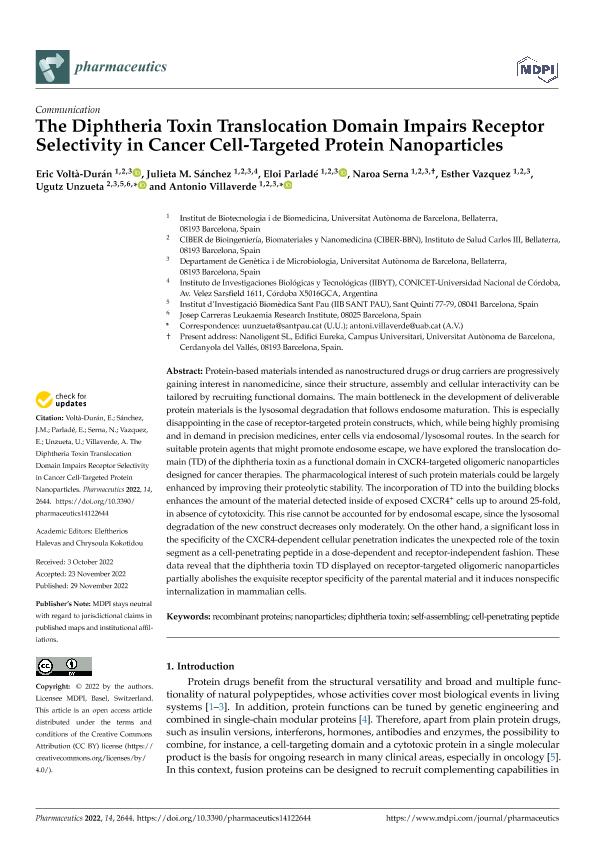Mostrar el registro sencillo del ítem
dc.contributor.author
Voltà Durán, Eric
dc.contributor.author
Sanchez, Julieta Maria

dc.contributor.author
Parladé, Eloi
dc.contributor.author
Serna, Naroa
dc.contributor.author
Vazquez, Esther
dc.contributor.author
Unzueta, Ugutz
dc.contributor.author
Villaverde, Antonio
dc.date.available
2023-09-08T17:57:18Z
dc.date.issued
2022-12
dc.identifier.citation
Voltà Durán, Eric; Sanchez, Julieta Maria; Parladé, Eloi; Serna, Naroa; Vazquez, Esther; et al.; The Diphtheria Toxin Translocation Domain Impairs Receptor Selectivity in Cancer Cell-Targeted Protein Nanoparticles; MDPI; Pharmaceutics; 14; 12; 12-2022; 1-13
dc.identifier.issn
1999-4923
dc.identifier.uri
http://hdl.handle.net/11336/211005
dc.description.abstract
Protein-based materials intended as nanostructured drugs or drug carriers are progressively gaining interest in nanomedicine, since their structure, assembly and cellular interactivity can be tailored by recruiting functional domains. The main bottleneck in the development of deliverable protein materials is the lysosomal degradation that follows endosome maturation. This is especially disappointing in the case of receptor-targeted protein constructs, which, while being highly promising and in demand in precision medicines, enter cells via endosomal/lysosomal routes. In the search for suitable protein agents that might promote endosome escape, we have explored the translocation domain (TD) of the diphtheria toxin as a functional domain in CXCR4-targeted oligomeric nanoparticles designed for cancer therapies. The pharmacological interest of such protein materials could be largely enhanced by improving their proteolytic stability. The incorporation of TD into the building blocks enhances the amount of the material detected inside of exposed CXCR4+ cells up to around 25-fold, in absence of cytotoxicity. This rise cannot be accounted for by endosomal escape, since the lysosomal degradation of the new construct decreases only moderately. On the other hand, a significant loss in the specificity of the CXCR4-dependent cellular penetration indicates the unexpected role of the toxin segment as a cell-penetrating peptide in a dose-dependent and receptor-independent fashion. These data reveal that the diphtheria toxin TD displayed on receptor-targeted oligomeric nanoparticles partially abolishes the exquisite receptor specificity of the parental material and it induces nonspecific internalization in mammalian cells.
dc.format
application/pdf
dc.language.iso
eng
dc.publisher
MDPI
dc.rights
info:eu-repo/semantics/openAccess
dc.rights.uri
https://creativecommons.org/licenses/by/2.5/ar/
dc.subject
CELL-PENETRATING PEPTIDE
dc.subject
DIPHTHERIA TOXIN
dc.subject
NANOPARTICLES
dc.subject
RECOMBINANT PROTEINS
dc.subject
SELF-ASSEMBLING
dc.subject.classification
Bioquímica y Biología Molecular

dc.subject.classification
Ciencias Biológicas

dc.subject.classification
CIENCIAS NATURALES Y EXACTAS

dc.title
The Diphtheria Toxin Translocation Domain Impairs Receptor Selectivity in Cancer Cell-Targeted Protein Nanoparticles
dc.type
info:eu-repo/semantics/article
dc.type
info:ar-repo/semantics/artículo
dc.type
info:eu-repo/semantics/publishedVersion
dc.date.updated
2023-07-05T15:27:39Z
dc.journal.volume
14
dc.journal.number
12
dc.journal.pagination
1-13
dc.journal.pais
Suiza

dc.description.fil
Fil: Voltà Durán, Eric. Universitat Autònoma de Barcelona; España
dc.description.fil
Fil: Sanchez, Julieta Maria. Universitat Autònoma de Barcelona; España. Consejo Nacional de Investigaciones Científicas y Técnicas. Centro Científico Tecnológico Conicet - Córdoba. Instituto de Investigaciones Biológicas y Tecnológicas. Universidad Nacional de Córdoba. Facultad de Ciencias Exactas, Físicas y Naturales. Instituto de Investigaciones Biológicas y Tecnológicas; Argentina
dc.description.fil
Fil: Parladé, Eloi. Universitat Autònoma de Barcelona; España
dc.description.fil
Fil: Serna, Naroa. Universitat Autònoma de Barcelona; España
dc.description.fil
Fil: Vazquez, Esther. Universitat Autònoma de Barcelona; España
dc.description.fil
Fil: Unzueta, Ugutz. Universitat Autònoma de Barcelona; España
dc.description.fil
Fil: Villaverde, Antonio. Universitat Autònoma de Barcelona; España
dc.journal.title
Pharmaceutics
dc.relation.alternativeid
info:eu-repo/semantics/altIdentifier/doi/http://dx.doi.org/10.3390/pharmaceutics14122644
Archivos asociados
